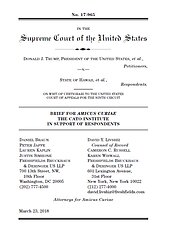Learn more about Cato’s Amicus Briefs Program.
Since January 27, 2017, the federal government has endeavored to ban immigration of nationals from at least six African and Middle Eastern countries. In September, it added North Koreans and a small number of Venezuelans to the list of targeted nationals and made the ban practically indefinite. To inform the Supreme Court’s review of the appeal in Trump v. Hawaii, Cato filed an amicus brief that provides an evidence-based analysis at the intersection of immigration and national security policy. The issues in the appeal include whether the ban is a lawful exercise of the President’s authority to suspend entry of certain foreign nationals to the United States, and also whether the ban violates the Establishment Clause of the Constitution.
The government claims to have selected the seven banned countries by applying a set of nine “neutral” baseline criteria to every country in the world. Yet the Proclamation enacting the ban shows that the government’s methodology was not consistently applied. In fact, the government did not ban dozens of countries that failed the baseline criteria. The government also applied higher-than-baseline criteria in order to justify including some of the targeted nationalities on the entry ban list, even though it failed to apply those more stringent criteria to other countries. In short, if there is some rhyme or reason to the government’s choices, the government certainly has not explained it.
The government also asserts that the targeted countries must be banned because the U.S. cannot obtain sufficient information to adjudicate visa applications for nationals of these countries. Yet under the law applicants bear the burden of providing the U.S. government with sufficient information in order to be granted a visa. If applicants cannot obtain certain information to prove their eligibility, consular officers deny them their visa applications. The government’s own data demonstrate that these officers already enforce this burden of proof and respond appropriately to the changing circumstances within these countries on an individualized basis. Thus, the only applicants impacted by the ban are those who can prove their eligibility.
Finally, the government claims that individualized vetting is “less reliable” in screening out terrorists and criminals from these countries than other countries. This claim is also baseless. In fact, the ban would not have prevented the entry of any terrorist who received a visa since (and including) 9/11 and who carried out—or even planned to carry out—an attack in the United States. Moreover, not a single national of the targeted countries has killed anyone in a terrorist attack in the United States since 1975. If anything, the Census Bureau data indicate that nationals of the targeted countries are significantly less likely to commit serious crimes in the United States than nationals of other countries, or even people born in the United States. The government’s justifications for the ban are simply without merit.
Freshfields Bruckhaus Deringer US LLP served as counsel to the Cato Institute. The attorneys on the briefs were Daniel Braun, Peter Jaffe, Lauren Kaplin, David Y. Livshiz, Cameron C. Russell, Justin Simeone, and Karen Wiswall, assisted by Karolina Ebel (bar admission pending) and Mark Onley.

